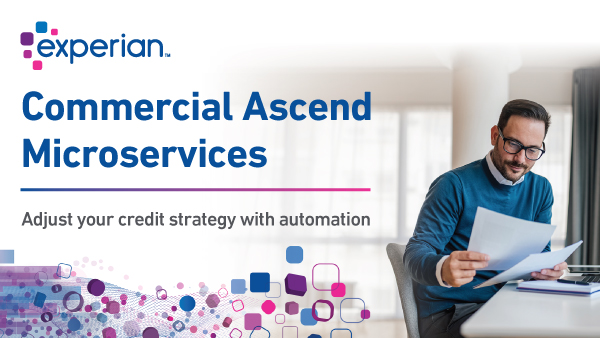Why leave money on the table during challenging economic times? In this post we explore how Experian’s Commercial Ascend Microservices can unlock hidden potential at a lower risk through automated reject inferencing and more.

Another year is well underway as businesses return to their offices and mull the state of the economy and the risks associated with it.
The unpredictable winter season, combined with the current economic outlook, reminds us of finding gratitude in unexpected places and making the most with what you have in strategizing through possibly yet one more dynamic year of unpredictable post-pandemic recovery.
As economic conditions remain in flux, resource-constrained firms should include automation in their processes to adjust commercial credit strategies, allowing them to bring on more accounts without taking on additional risk.
Whether your economic outlook is bearish or bullish, it is highly advisable as 2023 quickly approaches to leverage technology and data to make better business decisions, especially as resources, like human capital, dwindle with the current outlook and labor trends.
The post-pandemic world has seen a lot of socio-economic change that even the best risk managers could never have anticipated. We call it the new normal, but how does this new normal affect small businesses in gaining access to capital? Furthermore, how are firms upstream of those businesses affected from making sound decisions?
The lone commercial analyst and a tidal wave of new businesses
In an unexpected turn of events, the pandemic produced the most business starts ever recorded in years before, a drastic contrast from the volume of business closures that resulted from strict measures to stop the spread of the COVID-19 virus.
As reported from Experian’s Fall 2022 Beyond the Trends Report, forty percent of small businesses have been operating for less than one year. The pattern of new business formation has created a challenging environment for commercial credit analysts looking to bring on new accounts without taking on unprecedented risk. Advances in technology have made it possible for credit departments to better predict the likelihood of first payment defaults for this new breed of small business. However, analysts are still struggling with the ability to adjust to a rapidly changing economy.
Credit analysts wearing multiple hats, taking on more responsibility
Firms that serve small businesses by providing goods and services, leases, or loans often don’t have a dedicated analyst responsible for addressing commercial credit policy, often leaning on personnel who manage consumer credit strategies to do so. If you need to perform complex commercial analysis and model building to inform or adjust your credit policy, it really requires a dedicated hand familiar with the nuances of the consumer or commercial space, if not both.
Microservices: a windfall for banks and small business service providers
The new microservices from Experian Business Information Services offer a faster, more dynamic experience for firms looking to carry out commercial analyses at lower costs and significantly less time.
The Ascend Commercial Suite addresses the analytical needs of firms at every level of sophistication. This includes commercial benchmarking to understand your competitive market position, analytical microservices, graduated levels of sandbox capabilities, and even cloud-to-cloud data transfer.
The ability to automate reject inferencing can be a saving grace for credit departments that need to grow commercial lines of business in a rapidly changing market that carries more risk. Firms need to be able to adjust to deteriorating economic conditions more rapidly. Reject inferencing can help credit analysts to redevelop their scorecards, adjust their buy box or lending volume, and validate scores in less time and at a lower cost.
Leave fewer deals on the table by optimizing buy box parameters
Commercial lenders and service providers are still challenged when learning from rejected applicants who did not meet the criteria. In higher-risk situations, validating the scorecard to ensure it works as intended is critical. Why leave money on the table in lean economic times? These denied applicants may not pose more risk than others if the buy box is optimal.
Suppose reject inferencing can be done more quickly. In that case, firms can check their buy box, adjust it without redeveloping credit score models, and expand use cases where information learned from the analysis could become very helpful. Many firms need to gain this edge by expanding their lending footprint, with minimal resources, to carry out analytical work.
To meet this challenge, Experian’s Ascend Commercial Microservices helps firms to quickly identify the grey areas near score cut-offs. The area where applicants that should be approved are denied, even though they are well within the risk tolerance.
The reject inferencing microservice also lends valuable insights to new credit model development by providing a sample of application criteria that would be rejected, commonly known as, a sample of ‘bads’, for firms that don’t have a large enough sample to test within their models.
The benefits of automated reject inferencing along with score validation
Automated microservices from the Ascend Commercial Suite have long-term benefits that spur the development of future credit strategies. Firms that adjust their credit policies quickly can boost account acquisition to bring on more customers without increasing risk. This facilitates sustainable growth. Suppose you are a credit analyst who fears an economic downturn. In that case, you can now tighten your buy box quickly, dynamically, and more often, as many microservices take a fraction of the time it would to do the work manually and at a lower cost.
The ease of conducting automated reject inferencing and other analyses this way can enable firms to perform analysis more frequently instead of waiting years to adjust to economic cycles.
The Ascend Commercial Suite Microservices are a beneficial tool to automate commercial analytics and answer some of the most pressing analytical questions that firms have in addressing their credit strategy, given rapid economic fluctuations and labor trends.
If you would like to learn how automated microservices like reject inferencing can answer questions about how commercial models will perform in a changing economy, connect with us today.
